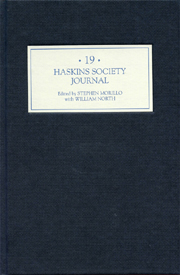Book contents
- Frontmatter
- Contents
- Editor's Note
- Abbreviations
- 1 King Harold's Daughter
- 2 The Anglo-Saxon Chronicles, Identity and the Making of England
- 3 Master Arnulf, Archdeacon of Rouen, Unlicensed Pluralism, and Idoneitas. Defining Eligibility in the Early Thirteenth Century
- 4 The Saint Zenobius Dossal by the Master of the Bigallo and the Cathedral Chapter of Florence
- 5 Discovering the Aquitanian Church in the Corpus of Ademar of Chabannes
- 6 Robert de Londres, Illegitimate Son of William, King of Scots, c.1170–1225
- 7 The Use of Naval Power in the Norman Conquest of Southern Italy and Sicily
- 8 Apology, Protest, and Suppression: Interpreting the Surrender of Caen (1105)
- 9 Henry Loyn and the Context of Anglo-Saxon England
2 - The Anglo-Saxon Chronicles, Identity and the Making of England
Published online by Cambridge University Press: 12 September 2012
- Frontmatter
- Contents
- Editor's Note
- Abbreviations
- 1 King Harold's Daughter
- 2 The Anglo-Saxon Chronicles, Identity and the Making of England
- 3 Master Arnulf, Archdeacon of Rouen, Unlicensed Pluralism, and Idoneitas. Defining Eligibility in the Early Thirteenth Century
- 4 The Saint Zenobius Dossal by the Master of the Bigallo and the Cathedral Chapter of Florence
- 5 Discovering the Aquitanian Church in the Corpus of Ademar of Chabannes
- 6 Robert de Londres, Illegitimate Son of William, King of Scots, c.1170–1225
- 7 The Use of Naval Power in the Norman Conquest of Southern Italy and Sicily
- 8 Apology, Protest, and Suppression: Interpreting the Surrender of Caen (1105)
- 9 Henry Loyn and the Context of Anglo-Saxon England
Summary
The writing of history, and the uses of history, are currently topics of great interest to medieval historians. It is an interest shared by historians of early medieval Europe: by those concerned with the making of peoples, what is sometimes termed ‘ethnogenesis’, and by those interested in political legitimation. History is seen as the story or myth which defines groups; more debatably as the common shared memory by which groups define themselves. These functions of the remembered past can, it is argued, be tapped or manipulated for specific purposes, including and especially for legitimacy. Common to all this work is the perception of the power of the past, its significance for those living in the present, including for their own sense of themselves and their identity. This perception thus casts the writing of history, and the production of it, as at least potentially political acts. Whether consciously or unconsciously, to a greater or lesser extent, the writing of history is seen as an activity in which power is exercised, an ideological, though not necessarily a crudely propagandist, activity. The fact of the writing of history, and not merely the facts which that writing records, is now recognized as a potential source for our understanding of political attitudes, of group and individual identity, if not of group formation itself.
- Type
- Chapter
- Information
- The Haskins Society Journal 192007 - Studies in Medieval History, pp. 28 - 50Publisher: Boydell & BrewerPrint publication year: 2008



